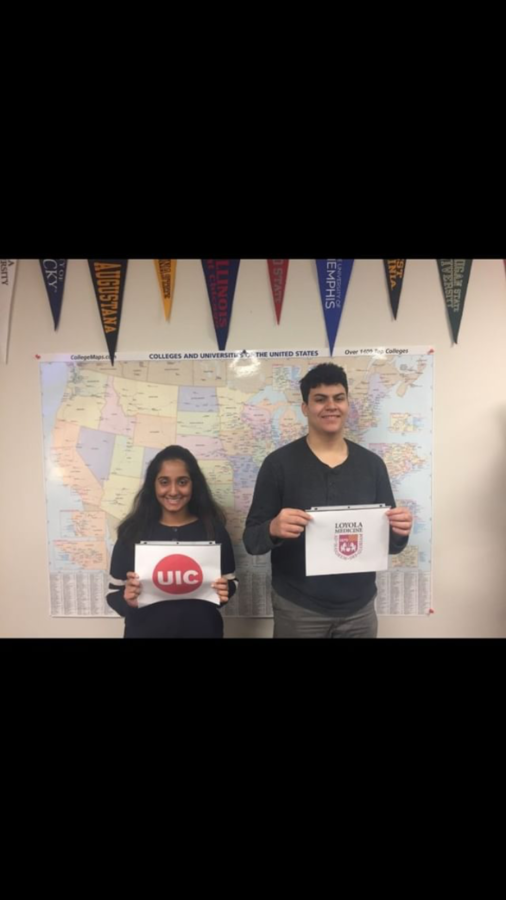Students consider direct graduate school
Ria Subramanian and Ibrahim Ben Hadj Tahar pose for a photo in the CRC.
Knowing she wanted to be a doctor was one thing for Ria Subramanian (12), but deciding to commit eight years of her life to that path at the age of 18 is another.
While many seniors have made decisions about what they will do with the next two or four years of their lives, some students are already applying and committing to programs that they will be a part of once they complete their undergraduate education. Most of these students commit to either medicine or law school, essentially locking themselves into a career while they are still in high school.
Subramanian was accepted into UIC’s Guaranteed Professional Programs Admissions (GPPA) for Medicine. Deciding to follow this path guarantees her a spot in UIC’s medical program after she finishes her undergraduate degree. The commitment she made means that she will spend the next eight years at UIC, set in her decision of becoming a doctor.
One of the main benefits that comes with being a part of these programs is that the preparation for medical school during a student’s undergrad is much less intense and stressful than a student who applies after high school.
“[I’ve] already worked so hard in high school, so now I can explore other interests during my undergraduate because I have a guaranteed seat,” Subramanian said.
The programs are designed for students who are completely sure of their career paths, so while leaving the program is an option, when accepting a spot, the implication is that students will be able to make the commitment for eight years.
“I have to be 100 percent certain that I want to be a doctor. It doesn’t give me any wiggle room. Whereas if I choose a different option, I can end up choosing anything I want,” Subramanian said.
Ibrahim Ben Hadj Tahar (12) also applied and was accepted into UIC’s GPPA. He chose not to go to UIC and did not commit to a program like this, despite knowing he wanted to be a doctor.
“The reason I applied was for the assurance, it’s not another worry after college,” Ben Hadj Tahar said. “It’s a full time commitment to medicine, though. For these types of programs, you’re much more stuck.”
While applying and committing to programs in high school guarantees a spot will be open for the student, they still have to maintain a certain GPA and score the same or above the average on the Medical College Admissions Test (MCAT) as the previous year’s class.
The application and research process for these programs tends to be much more independent for students. While many students use resources such as teachers and the CRC to guide decision making, the students who apply for these programs tend to do most of the decisions making and research on their own.
“I have never had to advise students to go for this,” Rebecca Bellito, college resource counselor said. “It seems that students have really self-selected. It’s usually high-achieving students who are very confident that becoming a doctor is what they want….and they have done the research.”
Students first have to apply to the school and be accepted into the Honors College on top of applying to GPPA. The application to GPPA includes multiple essays and a series of interviews.
These advanced programs are selective in terms of the number of schools that offer them as well as the percentage of applicants admitted. In UIC’s medical program specifically, an average of eight percent of applicants are admitted to GPPA.
“They’re very selective programs. Only a very small number of students get into direct admit med school programs,” Bellito said.
The pressure that comes with this choice can cause a lot of indecision. By making the initial commitment of just four years, there is more freedom in choosing a career path as well as a college.
“The decision is: Am I willing to take the risk and go for another four years where I know there will be a lot of academic challenges, or do I take the safe way and do the eight years?” Subramanian said.

